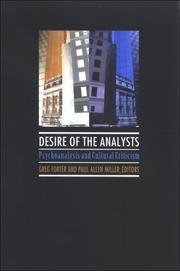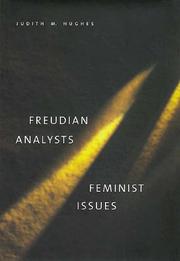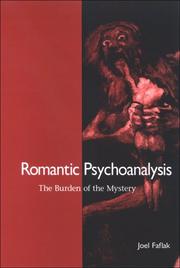| Listing 1 - 8 of 8 |
Sort by
|
Book
ISBN: 9781577332077 Year: 2008 Publisher: Nevada City Blue Dolphin
Abstract | Keywords | Export | Availability | Bookmark
 Loading...
Loading...Choose an application
- Reference Manager
- EndNote
- RefWorks (Direct export to RefWorks)
Psychiatrists --- Tan, Yuci, --- China --- History
Book
ISBN: 9782705667474 2705667474 Year: 2008 Publisher: Paris Hermann
Abstract | Keywords | Export | Availability | Bookmark
 Loading...
Loading...Choose an application
- Reference Manager
- EndNote
- RefWorks (Direct export to RefWorks)
Psychiatry --- Psychiatrie --- Schotte, Jacques --- Psychiatrists --- Schotte, Jacques, --- Schotte, J. --- Schotte, Jacques (1928-2007) --- Ethnopsychiatrie --- Destin, Analyse du --- Biographies --- Pratique
Book
ISBN: 9782749209630 Year: 2008 Publisher: Ramonville Saint-Agne : Erès,
Abstract | Keywords | Export | Availability | Bookmark
 Loading...
Loading...Choose an application
- Reference Manager
- EndNote
- RefWorks (Direct export to RefWorks)
Child psychiatrists --- Behavioral assesment of infants --- Infant psychology --- Pédopsychiatres --- Analyse comportementale des nourissons --- Nourrissons --- Congresses --- Congrès --- Psychologie --- Bick, Esther, --- Pédopsychiatres --- Congrès --- Nouveau-né --- Observation
Book
ISBN: 9780801890406 0801890403 Year: 2008 Publisher: Baltimore Johns Hopkins University Press
Abstract | Keywords | Export | Availability | Bookmark
 Loading...
Loading...Choose an application
- Reference Manager
- EndNote
- RefWorks (Direct export to RefWorks)
This riveting account of medical detective work traces the story of kuru, a fatal brain disease, and the pioneering scientists who spent decades searching for its cause. When whites first encountered the Fore people in the isolated highlands of colonial New Guinea during the 1940s and 1950s, they found a people in the grip of a bizarre epidemic. Women and children succumbed to muscle weakness, uncontrollable tremors, and lack of coordination, until death inevitably supervened. Facing extinction, the Fore attributed their unique and terrifying affliction to a particularly malign form of sorcery.The Collectors of Lost Souls tells the story of the resilience of the Fore through this devastating plague, their transformation into modern people, and their compelling attraction for a throng of eccentric and adventurous scientists and anthropologists. Battling competing scientists and the colonial authorities, the brilliant and troubled American doctor D. Carleton Gajdusek determined that the cause of kuru was a new and mysterious agent of infection, which he called a slow virus (now called prions). Anthropologists and epidemiologists soon realized that the Fore practice of eating their loved ones after death had spread the slow virus. Though the Fore were never convinced, Gajdusek received the Nobel Prize for his discovery. The study of kuru opened up a completely new field of medical investigation, challenging our understanding of the causes of disease. But The Collectors of Lost Souls is far more than a tantalizing case study of scientific research in the twentieth century. It is a story of how a previously isolated people made contact with the world by engaging with its science, rendering the boundary between primitive and modern completely permeable. It tells us about the complex and often baffling interactions of researchers and their erstwhile subjects on the colonial frontier, tracing their ambivalent exchanges, passionate engagements, confused estimates of value
Fore (Papua New Guinean people) --- Kuru --- Neurologists --- Virologists --- Biomedical Research --- Cannibalism --- Funeral Rites --- History, 20th Century --- Diseases. --- History. --- history --- Gajdusek, D. Carleton --- Gajdusek, D. Carleton, --- #SBIB:39A76 --- #SBIB:39A9 --- Etnografie: Oceanië --- Medische antropologie / gezondheid / handicaps --- Central nervous system --- Slow virus diseases --- Fore (New Guinea people) --- Ethnology --- Papuans --- Microbiologists --- Physicians --- Psychiatrists --- Diseases --- History --- Gajdusek, Daniel Carleton, --- Monograph

ISBN: 1435658620 9781435658622 9780791472996 079147299X Year: 2008 Publisher: Albany, NY State University of New York Press
Abstract | Keywords | Export | Availability | Bookmark
 Loading...
Loading...Choose an application
- Reference Manager
- EndNote
- RefWorks (Direct export to RefWorks)
Psychoanalysis and culture. --- Psychoanalysis and culture --- Sociology --- Humanities --- Anthropology, Cultural --- Psychiatry --- Social Sciences --- Anthropology --- Behavioral Sciences --- Behavioral Disciplines and Activities --- Anthropology, Education, Sociology and Social Phenomena --- Psychiatry and Psychology --- Culture --- Literature --- Psychoanalysis --- Psychology --- Psychodynamic Analysis --- Analyses, Psychodynamic --- Analysis, Psychodynamic --- Psychodynamic Analyses --- Literatures --- Beliefs --- Cultural Background --- Cultural Relativism --- Customs --- Background, Cultural --- Backgrounds, Cultural --- Belief --- Cultural Backgrounds --- Cultural Relativisms --- Cultures --- Relativism, Cultural --- Relativisms, Cultural --- Proxemics --- Behavioral Science --- Proxemic --- Science, Behavioral --- Sciences, Behavioral --- Science, Social --- Sciences, Social --- Social Science --- Psychiatrists --- Psychiatrist --- Cultural Anthropology --- Material Culture --- Ethnography --- Culture, Material --- Ethnographies --- Material Cultures --- Qualitative Research --- General Social Development and Population --- Culture and psychoanalysis

ISBN: 030014718X 0585371997 9780585371993 9780300147186 0300075243 9780300075243 0300075243 Year: 2008 Publisher: New Haven, CT : Yale University Press,
Abstract | Keywords | Export | Availability | Bookmark
 Loading...
Loading...Choose an application
- Reference Manager
- EndNote
- RefWorks (Direct export to RefWorks)
In this important book Judith M. Hughes makes a highly original case for conceptualizing gender identity as potentially multiple. She does so by situating her argument within the history of psychoanalysis.Hughes traces a series of conceptual lineages, each descending from Freud. In the study Helene Deutsch, Karen Horney, and Melanie Klein occupy prominent places. So too do Erik H. Erikson and Robert J. Stoller. Among contemporary theorists Carol Gilligan and Nancy Chodorow are included in Hughes's roster.In each lineage Hughes discerns an evolutionary narrative: Deutsch tells a story of retrogression; Erikson names his epigenesis, and Gilligan continues in that vein; Horney's discussion recalls sexual selection; Stoller's and Chodorow's theorizing brings artificial selection to mind; and finally in Klein's work Hughes sees a story of natural selection and adds to it her own notion of multiple gender identities.
Psychoanalysis and feminism. --- Psychoanalysis and feminism --- Psychiatry --- Humanism --- Ethics --- Behavioral Sciences --- Humanities --- Behavioral Disciplines and Activities --- Philosophy --- Psychiatry and Psychology --- Feminism --- Psychoanalysis --- Social Sciences --- Psychology --- Psychodynamic Analysis --- Analyses, Psychodynamic --- Analysis, Psychodynamic --- Psychodynamic Analyses --- Feminist Ethics --- Ethics, Feminist --- Women's Rights --- Pharmacy Philosophy --- Philosophical Overview --- Hedonism --- Stoicism --- Overview, Philosophical --- Overviews, Philosophical --- Pharmacy Philosophies --- Philosophical Overviews --- Philosophies --- Philosophies, Pharmacy --- Philosophy, Pharmacy --- Proxemics --- Behavioral Science --- Proxemic --- Science, Behavioral --- Sciences, Behavioral --- Egoism --- Ethical Issues --- Metaethics --- Moral Policy --- Natural Law --- Situational Ethics --- Ethical Issue --- Ethics, Situational --- Issue, Ethical --- Issues, Ethical --- Law, Natural --- Laws, Natural --- Moral Policies --- Natural Laws --- Policies, Moral --- Policy, Moral --- Censorship, Research --- Psychiatrists --- Psychiatrist --- Feminism and psychoanalysis --- Psychiatry. --- Humanism. --- Ethics. --- Behavioral Sciences. --- Humanities. --- Behavioral Disciplines and Activities. --- Philosophy. --- Psychology. --- Feminism. --- Psychoanalysis.

ISBN: 1435628942 9781435628946 0791479226 9780791472699 0791472698 Year: 2008 Publisher: Albany, New York : State University of New York Press,
Abstract | Keywords | Export | Availability | Bookmark
 Loading...
Loading...Choose an application
- Reference Manager
- EndNote
- RefWorks (Direct export to RefWorks)
In this provocative work, Joel Faflak argues that Romanticism, particularly British Romantic poetry, invents psychoanalysis in advance of Freud. The Romantic period has long been treated as a time of incipient psychological exploration anticipating more sophisticated discoveries in the science of the mind. Romantic Psychoanalysis challenges this assumption by treating psychoanalysis in the Romantic period as a discovery unto itself, a way of taking Freud back to his future. Reading Romantic literature against eighteenth- and nineteenth-century philosophy, Faflak contends that Romantic poetry and prose—including works by Coleridge, De Quincey, Keats, and Wordsworth—remind a later psychoanalysis of its fundamental matrix in phantasy and thus of its profoundly literary nature.
English literature --- Romanticism --- Psychoanalysis and literature. --- Psychoanalysis and literature --- Psychoanalytic Interpretation --- Poetry as Topic --- Literature, Modern --- Psychoanalysis --- Literature --- Behavioral Disciplines and Activities --- Psychiatry --- Humanities --- Behavioral Sciences --- Psychiatry and Psychology --- English Literature --- English --- Languages & Literatures --- Literatures --- Psychodynamic Analysis --- Analyses, Psychodynamic --- Analysis, Psychodynamic --- Psychodynamic Analyses --- Modern Literature --- Interpretation, Psychoanalytic --- Psychoanalytical Interpretation --- Interpretation, Psychoanalytical --- Interpretations, Psychoanalytic --- Interpretations, Psychoanalytical --- Psychoanalytic Interpretations --- Psychoanalytical Interpretations --- Literature and psychoanalysis --- Psychoanalytic literary criticism --- Proxemics --- Behavioral Science --- Proxemic --- Science, Behavioral --- Sciences, Behavioral --- Pseudo-romanticism --- Romanticism in literature --- Aesthetics --- Fiction --- Literary movements --- Psychiatrists --- Psychiatrist --- British literature --- Inklings (Group of writers) --- Nonsense Club (Group of writers) --- Order of the Fancy (Group of writers) --- History and criticism. --- History and criticism --- Coleridge, Samuel Taylor, --- Wordsworth, William, --- De Quincey, Thomas, --- Keats, John, --- Kēts, Tzōn, --- Kits, Dzhon, --- Kʻichʻŭ, --- Quincey, Thomas de, --- De Kvinsi, Tomas, --- Kvinsi, Tomas de, --- De Quincy, Thomas, --- Quincy, Thomas de, --- DeQuincey, Thomas, --- Wœ̄tsawœ̄t, Winlīam, --- Wurdzwurth, Wilyam, --- Varḍsavartha Viliyama, --- Axiologus, --- Coleridge, S. T. --- Kolʹridzh, Samuil, --- Кольридж, Самуил, --- Kolʹridzh, Samuil Teĭlor, --- Кольридж, Самуил Тейлор, --- Kūlīridzh, Ṣāmwīl Tīlūr, --- קולרידג׳, סמיואל טיילור --- Kūlīridj, Ṣāmwīl Tīlūr, --- كولردج، صمويل تيلور, --- קאָלרידש, ס. ט., --- Criticism and interpretation. --- キーツ, ジョン
Book
ISBN: 1435658728 9781435658721 0791478874 9780791478875 Year: 2008 Publisher: Albany State University of New York Press
Abstract | Keywords | Export | Availability | Bookmark
 Loading...
Loading...Choose an application
- Reference Manager
- EndNote
- RefWorks (Direct export to RefWorks)
Narrative medicine --- Psychoanalysis --- Data Collection --- Communication --- Literature --- Psychiatry --- Health Care Evaluation Mechanisms --- Humanities --- Information Science --- Behavioral Sciences --- Epidemiologic Methods --- Behavior --- Behavioral Disciplines and Activities --- Public Health --- Behavior and Behavior Mechanisms --- Investigative Techniques --- Quality of Health Care --- Psychiatry and Psychology --- Health Care Quality, Access, and Evaluation --- Environment and Public Health --- Analytical, Diagnostic and Therapeutic Techniques and Equipment --- Health Care --- Narration --- Medicine in Literature --- Medicine --- Health & Biological Sciences --- Internal Medicine --- Literature, Medicine in --- in Literature, Medicine --- Psychodynamic Analysis --- Analyses, Psychodynamic --- Analysis, Psychodynamic --- Psychodynamic Analyses --- Narrative Ethics --- Ethics, Narrative --- Narrations --- Anecdotes as Topic --- Narrative Therapy --- Community-Based Distribution --- Contraceptive Distribution --- Delivery of Healthcare --- Dental Care Delivery --- Distribution, Non-Clinical --- Distribution, Nonclinical --- Distributional Activities --- Healthcare --- Healthcare Delivery --- Healthcare Systems --- Non-Clinical Distribution --- Nonclinical Distribution --- Delivery of Dental Care --- Health Care Delivery --- Health Care Systems --- Activities, Distributional --- Activity, Distributional --- Care, Health --- Community Based Distribution --- Community-Based Distributions --- Contraceptive Distributions --- Deliveries, Healthcare --- Delivery, Dental Care --- Delivery, Health Care --- Delivery, Healthcare --- Distribution, Community-Based --- Distribution, Contraceptive --- Distribution, Non Clinical --- Distributional Activity --- Distributions, Community-Based --- Distributions, Contraceptive --- Distributions, Non-Clinical --- Distributions, Nonclinical --- Health Care System --- Healthcare Deliveries --- Healthcare System --- Non Clinical Distribution --- Non-Clinical Distributions --- Nonclinical Distributions --- System, Health Care --- System, Healthcare --- Systems, Health Care --- Systems, Healthcare --- Healthcare Quality, Access, and Evaluation --- Pharmacy Audit --- Quality of Care --- Quality of Healthcare --- Audit, Pharmacy --- Care Quality --- Health Care Quality --- Healthcare Quality --- Pharmacy Audits --- Investigative Technics --- Investigative Technic --- Investigative Technique --- Technic, Investigative --- Technics, Investigative --- Technique, Investigative --- Techniques, Investigative --- Behavior And Behavior Mechanism --- Community Health --- Environment, Preventive Medicine & Public Health --- Environment, Preventive Medicine and Public Health --- Health, Community --- Health, Public --- Preventive Medicine --- Education, Public Health Professional --- Acceptance Process --- Acceptance Processes --- Behaviors --- Process, Acceptance --- Processes, Acceptance --- Healthcare Evaluation Mechanisms --- Evaluation Mechanism, Healthcare --- Evaluation Mechanisms, Healthcare --- Healthcare Evaluation Mechanism --- Mechanism, Healthcare Evaluation --- Mechanisms, Healthcare Evaluation --- Psychiatrists --- Psychiatrist --- Epidemiologic Method --- Epidemiological Methods --- Methods, Epidemiologic --- Epidemiological Method --- Method, Epidemiologic --- Method, Epidemiological --- Methods, Epidemiological --- Epidemiology --- Proxemics --- Behavioral Science --- Proxemic --- Science, Behavioral --- Sciences, Behavioral --- Information Sciences --- Science, Information --- Sciences, Information --- Communication Programs --- Communications Personnel --- Misinformation --- Personal Communication --- Social Communication --- Communication Program --- Communication, Personal --- Communication, Social --- Communications, Social --- Personnel, Communications --- Program, Communication --- Programs, Communication --- Social Communications --- Data Collection Methods --- Dual Data Collection --- Collection Method, Data --- Collection Methods, Data --- Collection, Data --- Collection, Dual Data --- Data Collection Method --- Method, Data Collection --- Methods, Data Collection --- Medical History Taking --- Empirical Research --- Psychology --- Psychology, Pathological --- Clinical medicine --- Physician and patient --- Literatures --- methods --- Narrative medicine. --- Psychoanalysis.
| Listing 1 - 8 of 8 |
Sort by
|

 Search
Search Feedback
Feedback About UniCat
About UniCat  Help
Help News
News